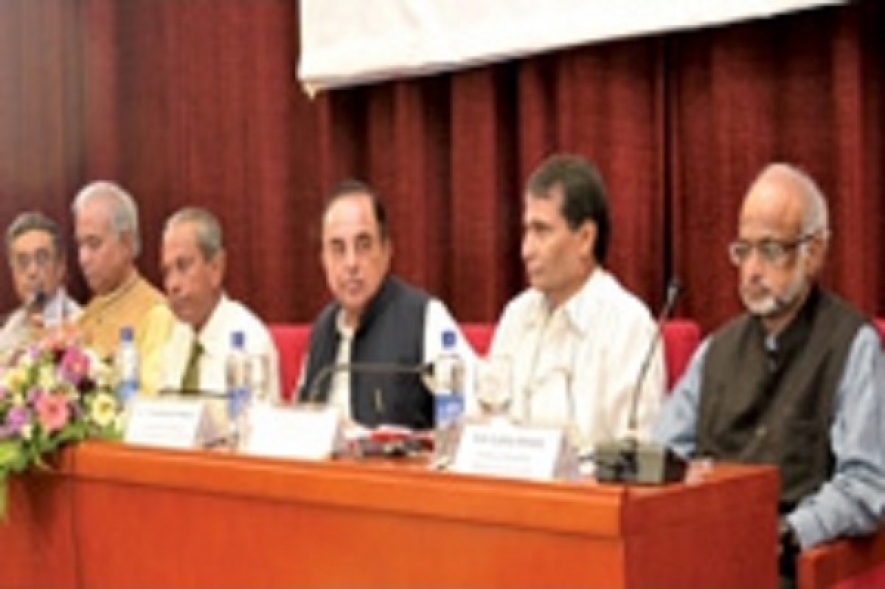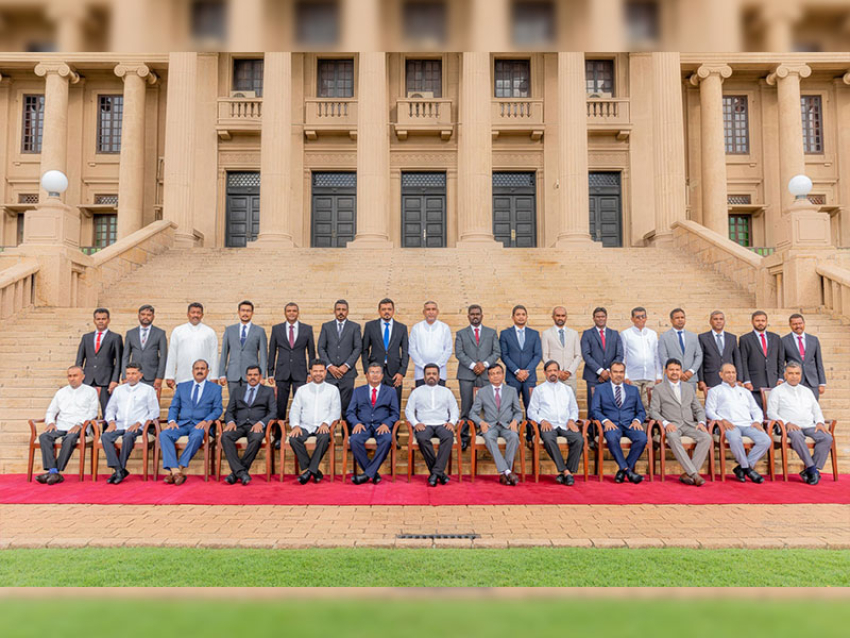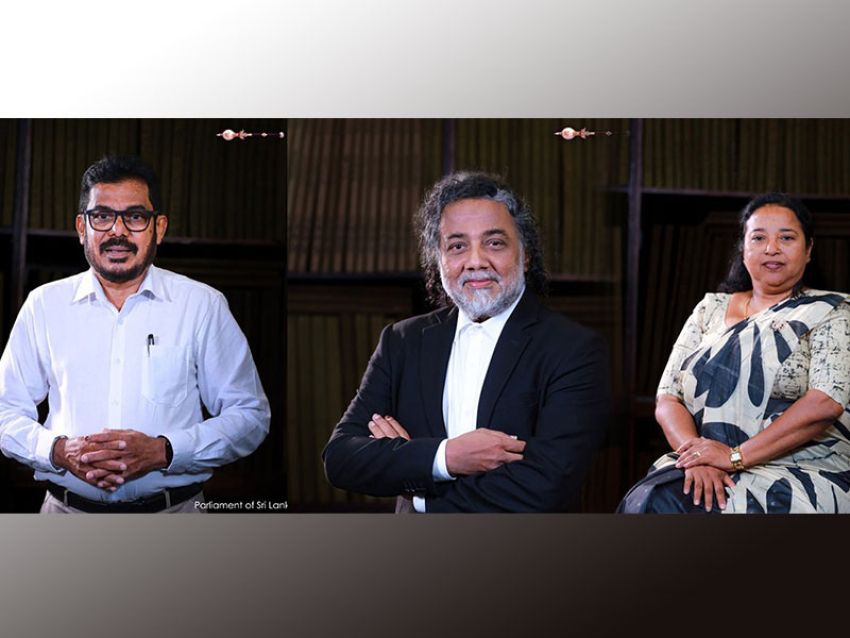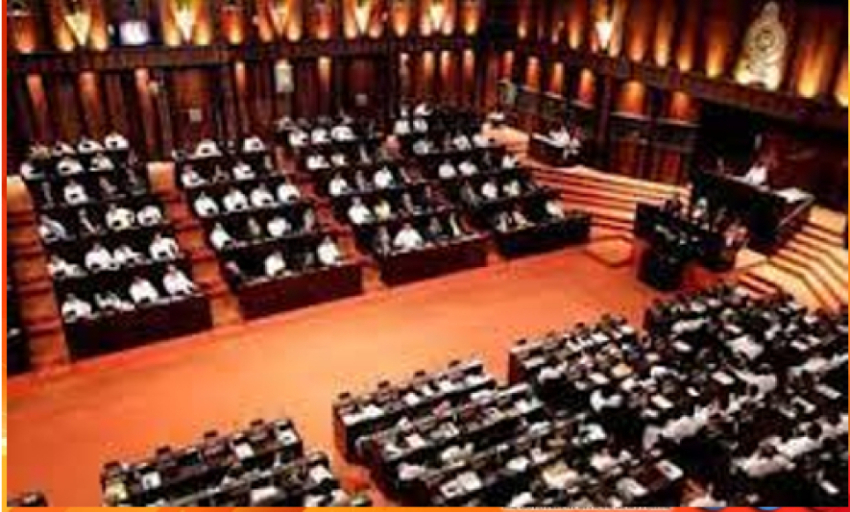The Modi victory
Dr. Swapan Dasgupta commenced the discussion by drawing attention to a startling resemblance that the audience in Sri Lanka could relate to. This parallel was the manner that the English speaking elite of India was unanimous in their view that Modi had to be stopped. It was the 'elite' factor on both sides that continue to play a role against the leaders of the two nations.
Dr. Swapan also showed that it was the age group between 18-25years that voted for Modi on a belief that change would happen. The change factor the audience was told was directed more at an economic revival in India rather than foreign factors.
Concerns of Indians and Modi were more directed towards generating employment, dealing with corruption, upgrading infrastructure, removing foreign investor fears and Dr. Swapan asked that Modi not be looked as a Milosevic DNA. Dr. Sheshadri echoed similar sentiments that investors had been backing off in view of the poor opinion on India and it was only Chennai and Gujarat that made a difference.
Modi's characteristic departure from conventional governance is what appealed to the people and why he eventually became the choice of the people. Dr. Sheshadari cited the invitation to SAARC leaders to attending the swearing in as an example of the unconventional stand of Modi. He also recalled how Sri Lanka entered international records by electing the first woman Prime Minister (Sirimavo Bandaranaike).
The logic of prosperity was also highlighted as being mutual and this thought was mooted with another welcome suggestion to consider building a collective commonwealth of Asian nations.
The reference to Sinhalativu by an Indian poet Bharatiyar in 1905 was welcomed by those continuously claiming that Sri Lanka was a Sinhale Nation.
Dr. Subramaniam's speech covered the personality aspect of Modi and reminded the audience the unique difference in India selecting as Premier a person belonging to the backward caste unlike all his predecessors. He cited how inspite of 14 of the 15 councils voting for Sarda Patel, Mahatma Gandhis' choice was Nehru.
Prof. Nalapath reiterated Modi mantra as being Minimum Government and Maximum Governance, a lesson Sri Lanka needs to take a leaf from.
Prof. Nalapat urged Sri Lanka to encourage English learning and build upon the entrepreneur skills of Jaffna while also reminding the power of Buddhism and its soft power reach. He also predicted a golden period in Indo-Lanka relations,
Dr. Suresh Prabhu the last speaker proudly reminded the audience that Modi was the 1st Prime Minister chosen by the people.
India under BJP was articulated by the BJP leaders:
Defeating Terrorism
* 'We (India) are proud that your President was able to defeat terrorism, which could have grown into even a more threatening menace'.
* 'We are very proud of your president for decisively finishing a sinister terror organisation that was a threat to our country too.
* Dr. Swamy says that he wonders whether the HR issues are contrived to 'belittle the importance of this decisive victory'.
* "no country has had a clear success in eliminating terrorism the way your country did."
Dr. Subramaniam's eloquence in pointing out the achievement of the Sri Lankan forces being the only country in the world to successfully eliminate such a dangerous terrorist organization completely was nothing that the members of the TNA present would have liked to hear.
The TNA leaders present (Sambanthan and Abraham Sumanthiran) would not have been pleased to hear Dr. Swamy's reference to the ongoing supreme court case wherein an affidavit has been sought from the ITAK to assure it is not aligned to a separatist agenda.
Dr. Swamy also pointed out that there was no genocide in Sri Lanka and only the Tamils living in UK and elsewhere were claiming there was genocide.
The fishermen issue also was cleared and appreciation was shown to fishermen being released but confiscating the trawlers.
Foreign Policy
* Indian foreign policy will be guided by national interest which supersedes the interests of the States.
* India to cooperate and partner with countries of the region.
* Modi desired to strengthen relations with SAARC nations - SAARC will be restructured to play bigger bilateral role. Dr. Swamy assured a new paradigm change would occur and Modi's 1st visit overseas to Bhutan signified the importance placed to SAARC.
* Dr. Sheshadari described India's new foreign policy as departing from Pakistan-centric to one of looking east as far as Israel, Japan and Indonesia.
* India to adopt an equi-distance policy with both US and China believing in a tripartite role.
* Dr. Nalapat spoke of the BRICS bank being an alternative to the monopoly of the World Bank/IMF.
* Dr. Suresh Prabhu suggestion of a SAARC satellite where India could partner with SAARC nations for growth.
* Partnerships with India will depend on mutual benefit and exchange of infrastructure.
UN / UNHRC
* Human Rights being selectively used by the international community (examples cited on lack of justice for killings by US upon Hiroshima, killings by British in Dresden, Germany). Collateral damage cannot apply only to the West. Countries accusing Sri Lanka had worse human rights records. Dr. Swamy declared that there was no requirement for Sri Lanka or India to be defensive.
* India assured Sri Lanka that India will be far more supportive of Sri Lanka's position at the UNHRC than ever before.
* UN has become an instrument of the North Atlantic Treaty Organization and is the PR office of NATO was the opinion voiced by Prof. Madhav Nalapat, UNESCO Chair for the Promotion of Peace and Nonviolence/Director Geopolitics and International Relations). If as Prof. Madhav Nalapat claimed UN was nothing but a wing of NATO and that the UN does what NATO wants it to do, it resonates the same message that Bolivia's President voiced echoing the need to replace UN with a global entity that is not looking after the interests of only the West and its Allies.
* The conclusion to be drawn from this was that Sri Lanka would not have faced any resolution if Sri Lanka had been servile to Western nations. That Sri Lanka refused to cave in led to the outcome of successive Resolutions. Many share Prof. Nalapat's stand - the West was behaving like a woman scorned! This type of vengeful diplomacy is not what we would expect from civilized western democracies!
* The statements made by Prof Nalapat in his speech that the UNHRC was an 'international joke' and UNHRC selects countries depending on whether the government is dominated by the West or not is a clear indication that the UNHRC is now a spent force. If UNHRC has become an international joke, countries agreeing to participate in the UNHRC would no doubt become jokers themselves.
Dr. Subramaniam Swamy's statement 'targeting of Sri Lanka over human rights issues has gone too far and has to stop' was no music to the TNA members present either. The music got worse when Dr. Swamy went on to say that India would give Sri Lanka 'more support than ever before'.
Tamil Nadu
* Tamil Nadu factor will no longer come between Indo-Lanka relations.
* Tamil Nadu no longer has veto power on Indo-Lanka relations.
* Tamil Nadu factor a creation by political classes funded by LTTE money raised by drug smuggling
* Dr. Subramaniam Swamy went to explained to the audience that apart from a fringe group voicing anti-Lanka slogans the Tamil Nadu people were not anti-Sri Lanka and even cited how Tamil cricket fans had travelled to Bangalore to cheer the Sri Lankan when the team were banned from playing in Chennai.
* He went on to show how the same anti-Lankan politicians had been defeated repeatedly at elections depicting that the Sri Lanka was never an election issue for Tamil Nadu (it looks another example of Media manipulating news against Sri Lanka)
* Dr. Subramaniam Swamy even urged Chief Minister Jayalalitha to visit Sri Lanka and 'get a reality check'.
Assurance to President Rajapakse
* "We said let us delink Indo-Lanka relations from Tamil Nadu and problems of the Tamils."
* Narendra Modi made a symbolic gesture in overruling the overriding opposition to the presence of President Rajapakse at the swearing in ceremony (which Tamil Nadu chief minister boycotted)
* Problems of Sri Lanka are for Sri Lankans to solve
Dr. Swamy's advice to Sri Lanka
* Remove reference to ETHNIC conflict - Sri Lanka had a terrorist conflict. A suggestion that has been echoed previously as well and the GOSL must declare all state publications and instruct the External Affairs Ministry to make the necessary changes to speeches, statements and all official documents
* Dr. Swamy admitted the fault made by Indira Gandhi in training LTTE
* Dr. Swamy's reference to Sri Lanka not delivering on the agreement with Chelvanayagam requires to be clarified and questioned as to how Sinhala Only opposition should lead to signing an agreement to devolve powers.
13th Amendment
* Reference to the 13th amendment by Indian delegations makes any to wonder whether the Sri Lankan authorities have failed to sit down and explain to the Indian counterparts exactly what has already been devolved which has been done with no special treatment to any province and that all the 9 PCs have not been given land or police powers. If none of the 9 provinces have land or police powers it is wrong for India even as a friend to refer to these two aspects as being 'unnecessarily unresolved'. What also needs to be added is that the GOSL has very clearly indicated that police powers would not be granted to the provinces while the status of land was bestowed upon the State by a recently concluded Supreme Court verdict. What needs to also be said is that the Northern Province is just one of the 9 provinces created under the 13th amendment and thus it cannot have any special treatment nor have foreign nations taking any special interest in it. That would be a direct interference of Sri Lanka's national security. Moreover, given the TNA links to a Christian Eelam lobby that India is well aware of, it baffles us as to why India wishes to promote a dangerous scenario which India may not have the power to control if Western influence is directed at a new territory they hope to create in Asia. India and Dr. Swamy are well aware of 'Break up India' giving superbly in the writings of Rajiv Malhotra. Therefore, it is no better a time than now for the two nations to decisively decide whether the 13a is a viable slogan in the context of geopolitical realities.
Investment Opportunities
* Former Union Minister Dr. Suresh Prabhu suggested that Sri Lanka could enter the energy market of India and compared how India had invested in Bhutan and India now buys electricity from Bhutan. He suggested that generating power from wind power would be a win-win strategy for both Sri Lanka and India. This next raises the interest and persistence in signing the Sampoor coal power plant with India with both countries knowing the environmental aspect and the studies that have revealed that Sampoor is not a worthwhile investment economically or politically for Sri Lanka and one that is likely to lead the Sri Lankan populace to extreme poverty and minus electricity given the rising electricity rates.
* Dr. Swamy also touched on the trade aspect highlighting the increase in FDI's and tourists.
* Dr. Suresh Prabhu also mooted the idea of a common tourism circuit where India and Sri Lanka could partner in marketing tourism.
* An area that would be contentious however was the suggestion to sign the CEPA obviously considering Indian interests only and it is left for Sri Lanka's decision makers to put country's interests before anything else.
The floor was open for questions and replying Dr. Nalapat declared that Modi's logic was simply 'If you are good to me, I will be good to you... if you are not... I am not obliged to be good to you'. It was advice well worth remembering.
Attorney Senaka Weeratne posed a question on how keen India was to protect territories outside of India where Indian civilizational influence prevails on account of aggressive Abrahamic incursions and Buddhist and Hindu space shrinking as a result and battling to survive. He drew upon how India was looked up to highlighting that neither Buddhists nor Hindus had external funds to defend or protect their space. The need for Buddhists and Hindus to build a block comparable to that of the OIC and EU was suggested. The panel welcomed the suggestion but chose not to elaborate but assured that the Prime Minister's attention would be drawn to it.
The promise of good days to come under Modi.
Sri Lanka, in particular the audience present were happy to hear of India's stand vis a vis the Tamil factor for it would silence the TNA in more ways than one. At the same time the stand on 13th amendment unless it was simply to show an open difference, is an area that India must realize the implications in view of plans to break up India.
The other stands taken by India on the UNHRC and Resolutions is a relief for it reminds India that the stand India should take is in India's own interest and not because of Sri Lanka.(MoD/KH)




















